Principles of Care and Good Practice: An Analysis in Healthcare
VerifiedAdded on 2023/06/08
|10
|3323
|194
Essay
AI Summary
This essay delves into the principles of care and good practice within health and social care services, emphasizing their significance in delivering effective and ethical patient care. It highlights key principles such as dignity, choice, partnership, independence, privacy, safety, rights, respect, inclusion, equality, and confidentiality. The essay discusses how these principles impact the rights of vulnerable individuals and addresses issues of care and control in healthcare settings. It further explores the role of legislation, including the Safeguarding Vulnerable Groups Act 2006, the Protection of Freedom Bills, the Care Act 2014, and the Health and Social Care Act 2012, in protecting vulnerable individuals. The importance of maintaining patient privacy, ensuring informed decision-making, and promoting equality within healthcare services are also examined. The essay concludes by underscoring the necessity of adhering to these principles to provide better protection and quality care to patients.
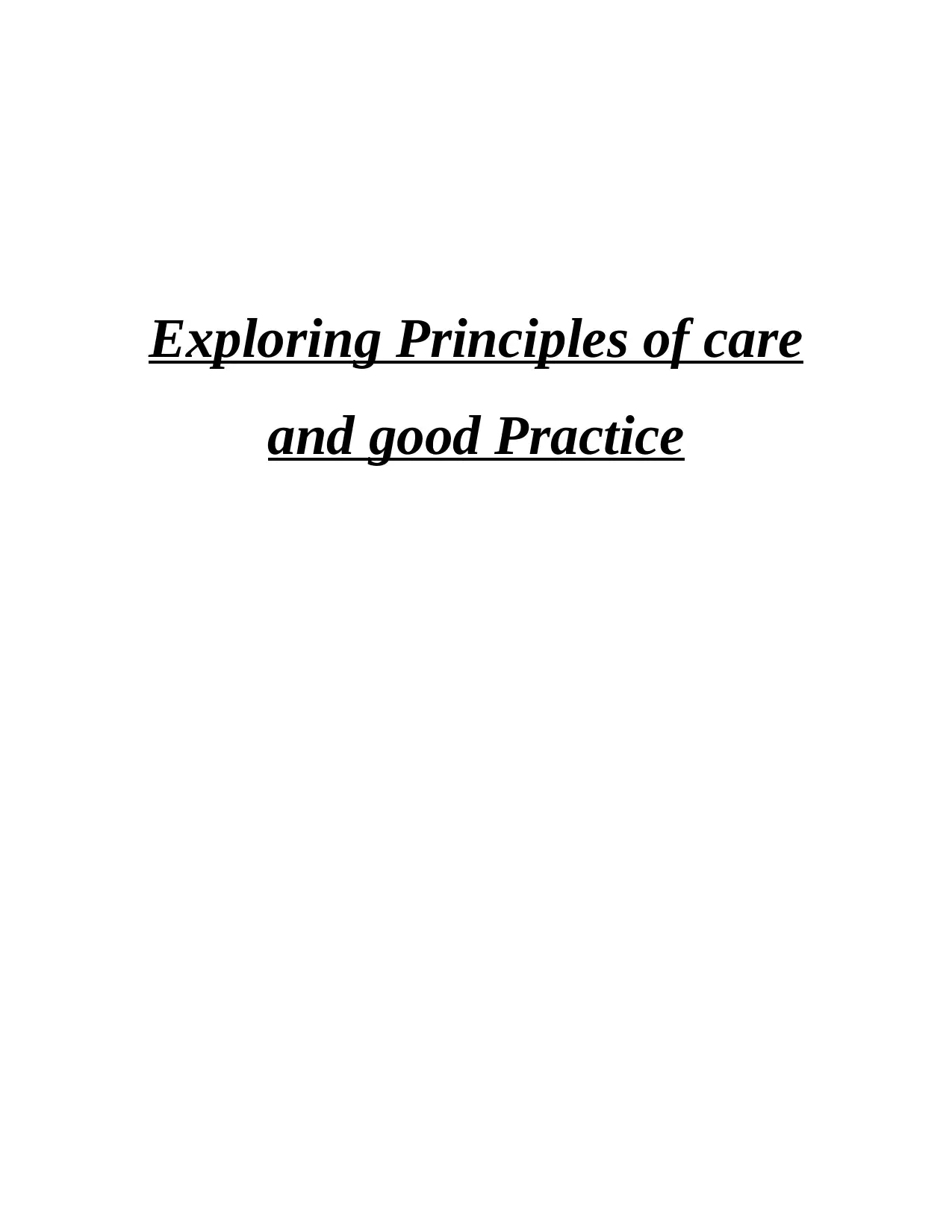
Exploring Principles of care
and good Practice
and good Practice
Paraphrase This Document
Need a fresh take? Get an instant paraphrase of this document with our AI Paraphraser
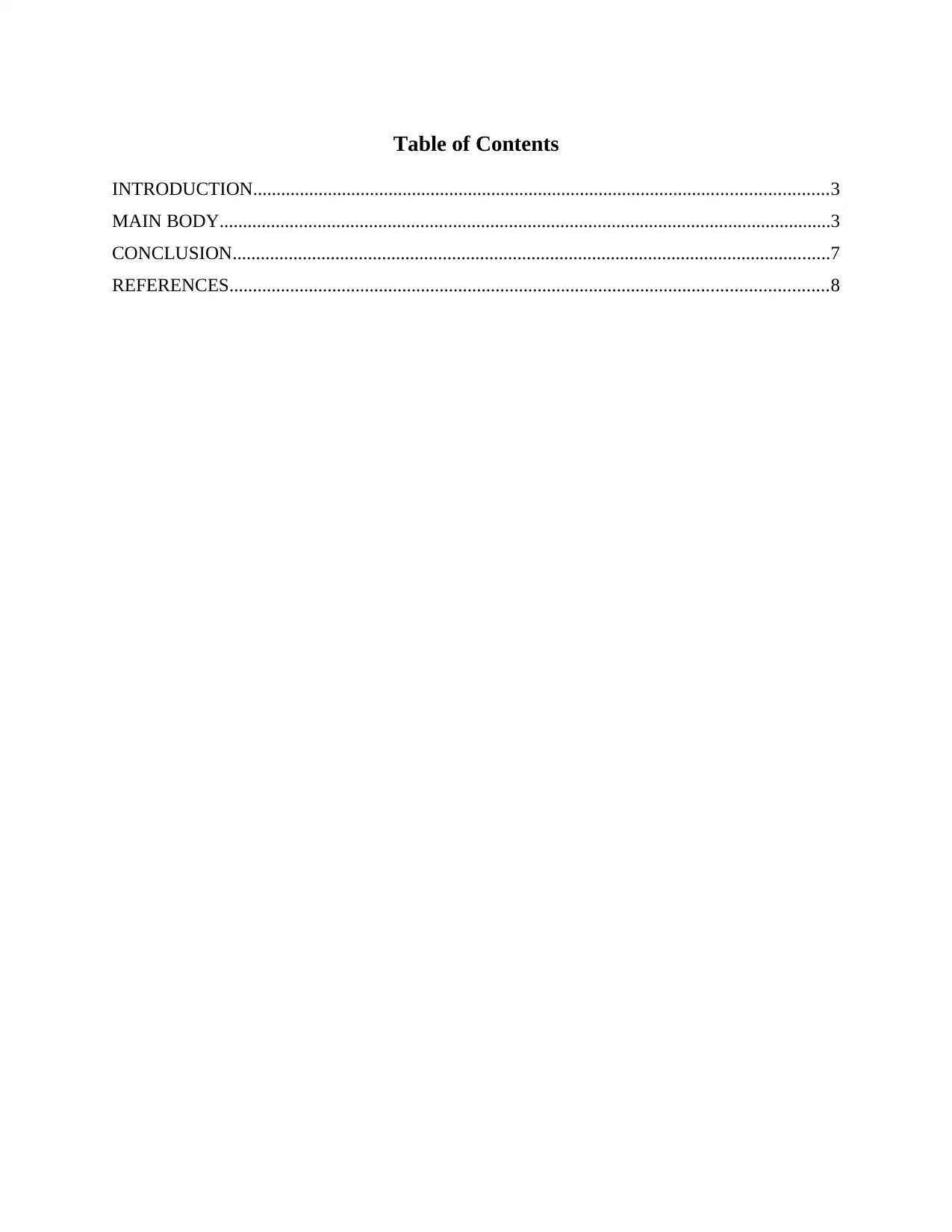
Table of Contents
INTRODUCTION...........................................................................................................................3
MAIN BODY...................................................................................................................................3
CONCLUSION................................................................................................................................7
REFERENCES................................................................................................................................8
INTRODUCTION...........................................................................................................................3
MAIN BODY...................................................................................................................................3
CONCLUSION................................................................................................................................7
REFERENCES................................................................................................................................8
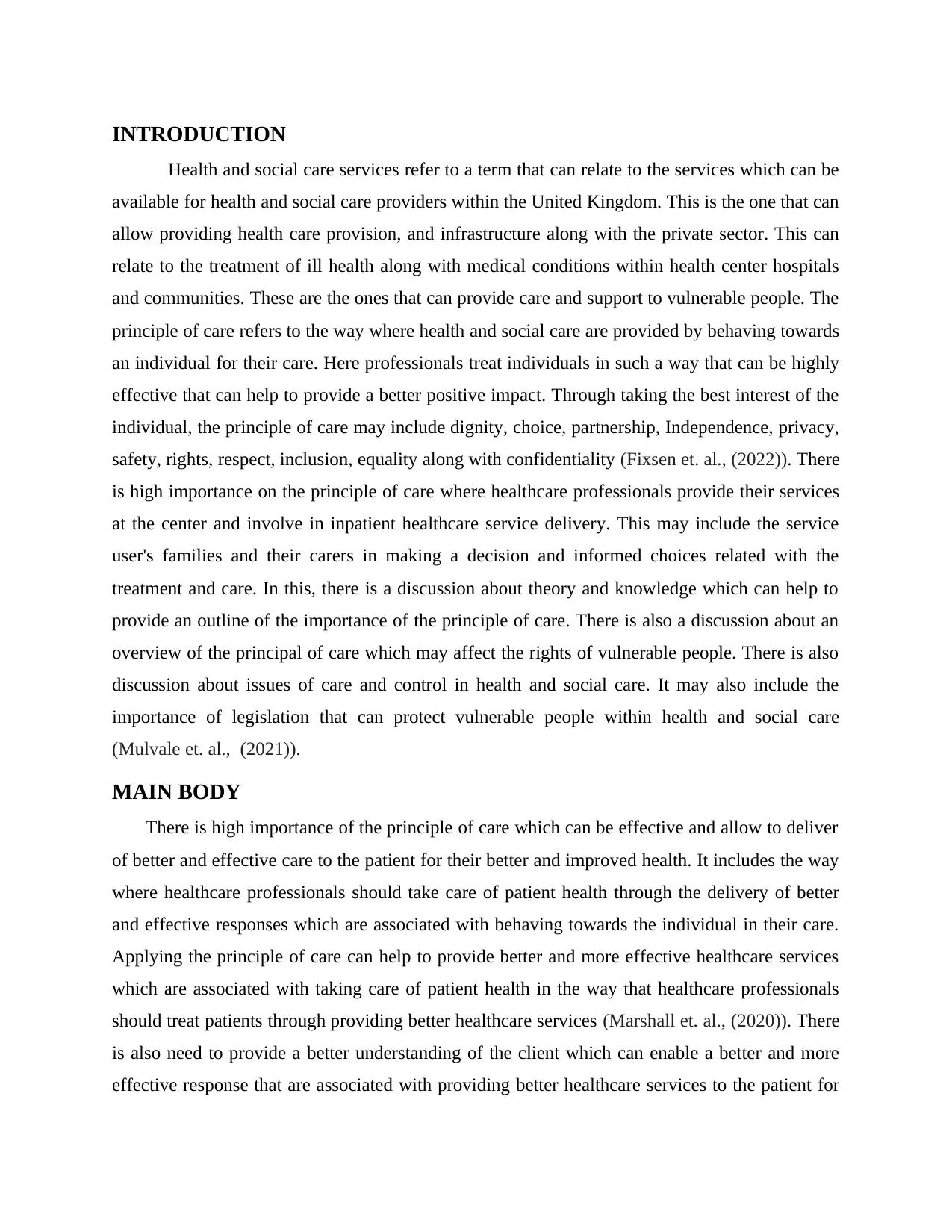
INTRODUCTION
Health and social care services refer to a term that can relate to the services which can be
available for health and social care providers within the United Kingdom. This is the one that can
allow providing health care provision, and infrastructure along with the private sector. This can
relate to the treatment of ill health along with medical conditions within health center hospitals
and communities. These are the ones that can provide care and support to vulnerable people. The
principle of care refers to the way where health and social care are provided by behaving towards
an individual for their care. Here professionals treat individuals in such a way that can be highly
effective that can help to provide a better positive impact. Through taking the best interest of the
individual, the principle of care may include dignity, choice, partnership, Independence, privacy,
safety, rights, respect, inclusion, equality along with confidentiality (Fixsen et. al., (2022)). There
is high importance on the principle of care where healthcare professionals provide their services
at the center and involve in inpatient healthcare service delivery. This may include the service
user's families and their carers in making a decision and informed choices related with the
treatment and care. In this, there is a discussion about theory and knowledge which can help to
provide an outline of the importance of the principle of care. There is also a discussion about an
overview of the principal of care which may affect the rights of vulnerable people. There is also
discussion about issues of care and control in health and social care. It may also include the
importance of legislation that can protect vulnerable people within health and social care
(Mulvale et. al., (2021)).
MAIN BODY
There is high importance of the principle of care which can be effective and allow to deliver
of better and effective care to the patient for their better and improved health. It includes the way
where healthcare professionals should take care of patient health through the delivery of better
and effective responses which are associated with behaving towards the individual in their care.
Applying the principle of care can help to provide better and more effective healthcare services
which are associated with taking care of patient health in the way that healthcare professionals
should treat patients through providing better healthcare services (Marshall et. al., (2020)). There
is also need to provide a better understanding of the client which can enable a better and more
effective response that are associated with providing better healthcare services to the patient for
Health and social care services refer to a term that can relate to the services which can be
available for health and social care providers within the United Kingdom. This is the one that can
allow providing health care provision, and infrastructure along with the private sector. This can
relate to the treatment of ill health along with medical conditions within health center hospitals
and communities. These are the ones that can provide care and support to vulnerable people. The
principle of care refers to the way where health and social care are provided by behaving towards
an individual for their care. Here professionals treat individuals in such a way that can be highly
effective that can help to provide a better positive impact. Through taking the best interest of the
individual, the principle of care may include dignity, choice, partnership, Independence, privacy,
safety, rights, respect, inclusion, equality along with confidentiality (Fixsen et. al., (2022)). There
is high importance on the principle of care where healthcare professionals provide their services
at the center and involve in inpatient healthcare service delivery. This may include the service
user's families and their carers in making a decision and informed choices related with the
treatment and care. In this, there is a discussion about theory and knowledge which can help to
provide an outline of the importance of the principle of care. There is also a discussion about an
overview of the principal of care which may affect the rights of vulnerable people. There is also
discussion about issues of care and control in health and social care. It may also include the
importance of legislation that can protect vulnerable people within health and social care
(Mulvale et. al., (2021)).
MAIN BODY
There is high importance of the principle of care which can be effective and allow to deliver
of better and effective care to the patient for their better and improved health. It includes the way
where healthcare professionals should take care of patient health through the delivery of better
and effective responses which are associated with behaving towards the individual in their care.
Applying the principle of care can help to provide better and more effective healthcare services
which are associated with taking care of patient health in the way that healthcare professionals
should treat patients through providing better healthcare services (Marshall et. al., (2020)). There
is also need to provide a better understanding of the client which can enable a better and more
effective response that are associated with providing better healthcare services to the patient for
⊘ This is a preview!⊘
Do you want full access?
Subscribe today to unlock all pages.

Trusted by 1+ million students worldwide
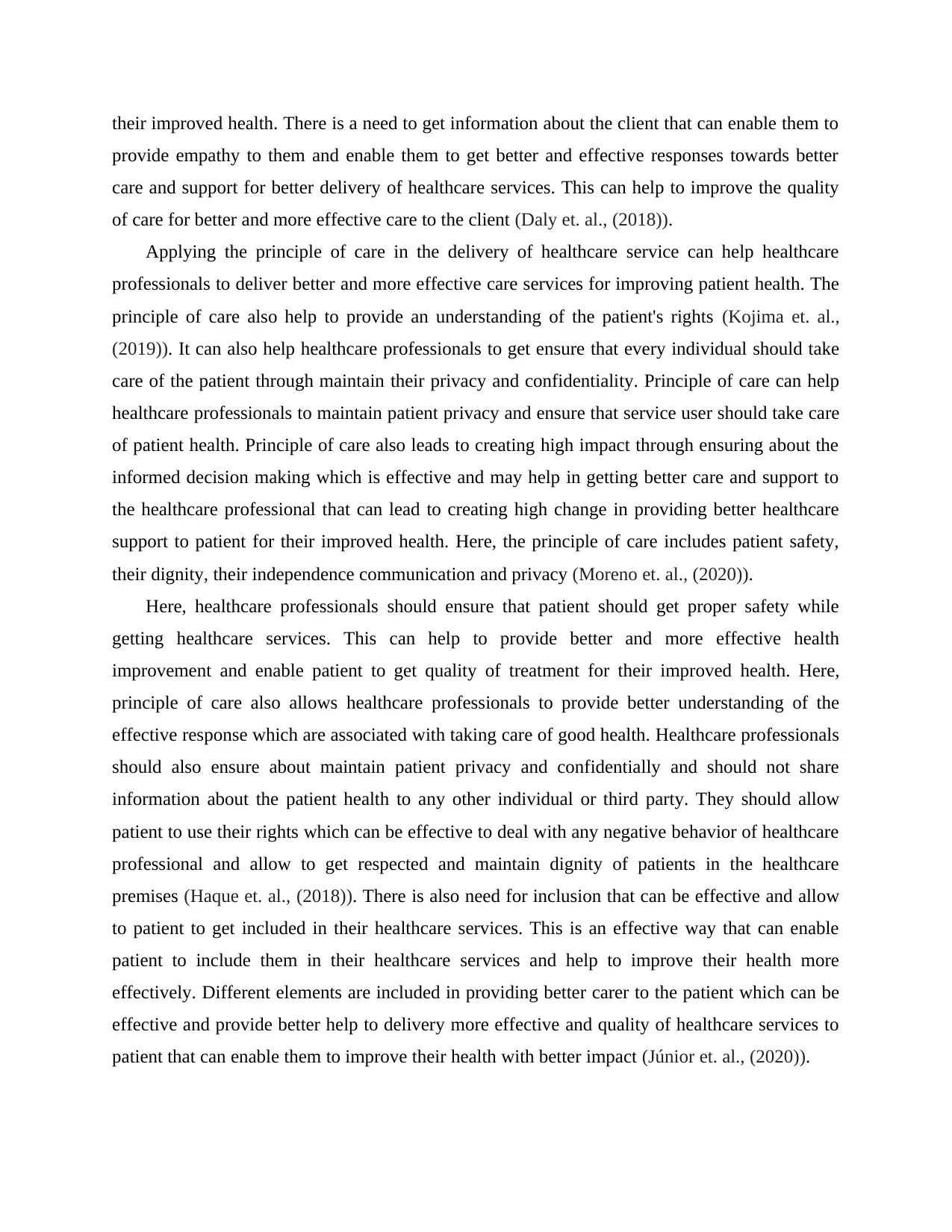
their improved health. There is a need to get information about the client that can enable them to
provide empathy to them and enable them to get better and effective responses towards better
care and support for better delivery of healthcare services. This can help to improve the quality
of care for better and more effective care to the client (Daly et. al., (2018)).
Applying the principle of care in the delivery of healthcare service can help healthcare
professionals to deliver better and more effective care services for improving patient health. The
principle of care also help to provide an understanding of the patient's rights (Kojima et. al.,
(2019)). It can also help healthcare professionals to get ensure that every individual should take
care of the patient through maintain their privacy and confidentiality. Principle of care can help
healthcare professionals to maintain patient privacy and ensure that service user should take care
of patient health. Principle of care also leads to creating high impact through ensuring about the
informed decision making which is effective and may help in getting better care and support to
the healthcare professional that can lead to creating high change in providing better healthcare
support to patient for their improved health. Here, the principle of care includes patient safety,
their dignity, their independence communication and privacy (Moreno et. al., (2020)).
Here, healthcare professionals should ensure that patient should get proper safety while
getting healthcare services. This can help to provide better and more effective health
improvement and enable patient to get quality of treatment for their improved health. Here,
principle of care also allows healthcare professionals to provide better understanding of the
effective response which are associated with taking care of good health. Healthcare professionals
should also ensure about maintain patient privacy and confidentially and should not share
information about the patient health to any other individual or third party. They should allow
patient to use their rights which can be effective to deal with any negative behavior of healthcare
professional and allow to get respected and maintain dignity of patients in the healthcare
premises (Haque et. al., (2018)). There is also need for inclusion that can be effective and allow
to patient to get included in their healthcare services. This is an effective way that can enable
patient to include them in their healthcare services and help to improve their health more
effectively. Different elements are included in providing better carer to the patient which can be
effective and provide better help to delivery more effective and quality of healthcare services to
patient that can enable them to improve their health with better impact (Júnior et. al., (2020)).
provide empathy to them and enable them to get better and effective responses towards better
care and support for better delivery of healthcare services. This can help to improve the quality
of care for better and more effective care to the client (Daly et. al., (2018)).
Applying the principle of care in the delivery of healthcare service can help healthcare
professionals to deliver better and more effective care services for improving patient health. The
principle of care also help to provide an understanding of the patient's rights (Kojima et. al.,
(2019)). It can also help healthcare professionals to get ensure that every individual should take
care of the patient through maintain their privacy and confidentiality. Principle of care can help
healthcare professionals to maintain patient privacy and ensure that service user should take care
of patient health. Principle of care also leads to creating high impact through ensuring about the
informed decision making which is effective and may help in getting better care and support to
the healthcare professional that can lead to creating high change in providing better healthcare
support to patient for their improved health. Here, the principle of care includes patient safety,
their dignity, their independence communication and privacy (Moreno et. al., (2020)).
Here, healthcare professionals should ensure that patient should get proper safety while
getting healthcare services. This can help to provide better and more effective health
improvement and enable patient to get quality of treatment for their improved health. Here,
principle of care also allows healthcare professionals to provide better understanding of the
effective response which are associated with taking care of good health. Healthcare professionals
should also ensure about maintain patient privacy and confidentially and should not share
information about the patient health to any other individual or third party. They should allow
patient to use their rights which can be effective to deal with any negative behavior of healthcare
professional and allow to get respected and maintain dignity of patients in the healthcare
premises (Haque et. al., (2018)). There is also need for inclusion that can be effective and allow
to patient to get included in their healthcare services. This is an effective way that can enable
patient to include them in their healthcare services and help to improve their health more
effectively. Different elements are included in providing better carer to the patient which can be
effective and provide better help to delivery more effective and quality of healthcare services to
patient that can enable them to improve their health with better impact (Júnior et. al., (2020)).
Paraphrase This Document
Need a fresh take? Get an instant paraphrase of this document with our AI Paraphraser
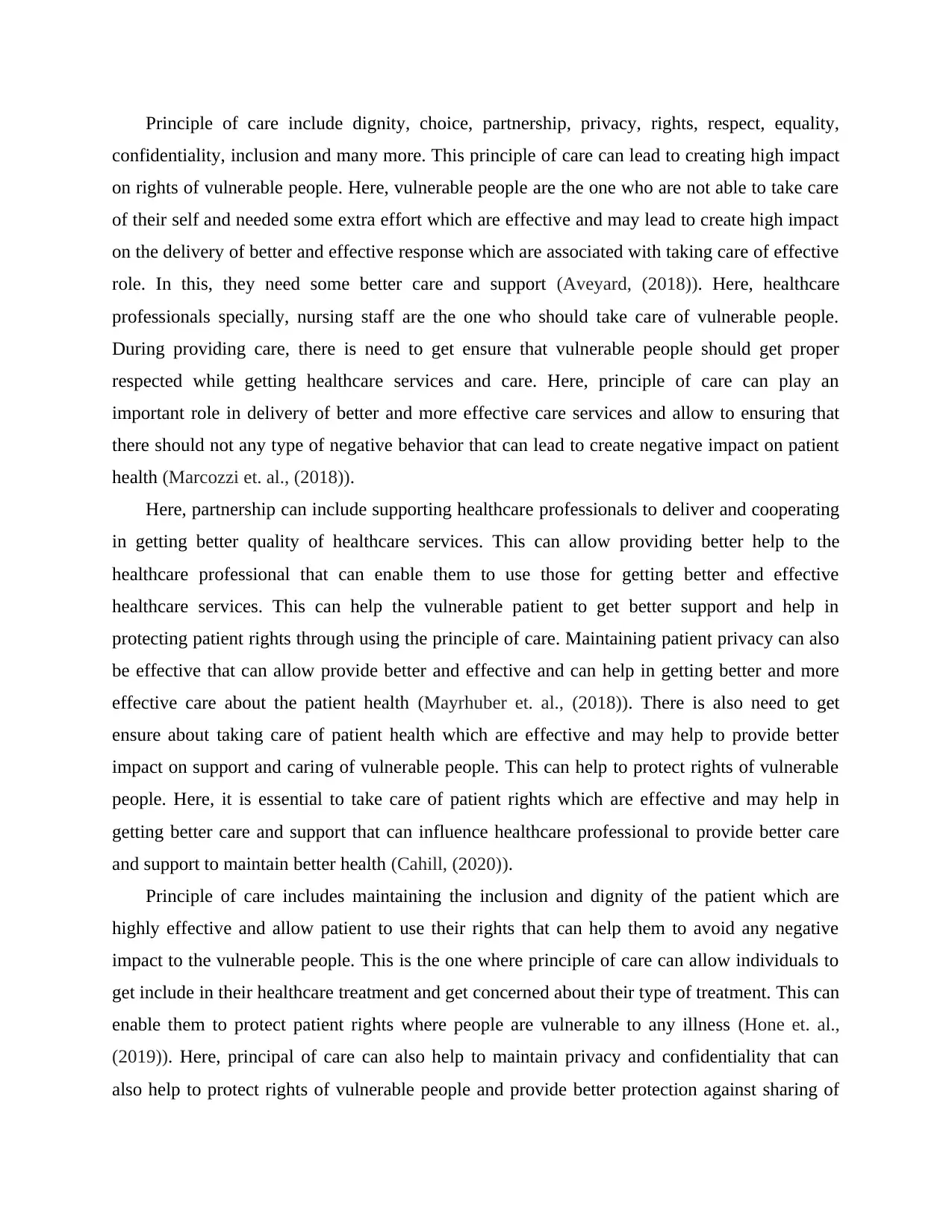
Principle of care include dignity, choice, partnership, privacy, rights, respect, equality,
confidentiality, inclusion and many more. This principle of care can lead to creating high impact
on rights of vulnerable people. Here, vulnerable people are the one who are not able to take care
of their self and needed some extra effort which are effective and may lead to create high impact
on the delivery of better and effective response which are associated with taking care of effective
role. In this, they need some better care and support (Aveyard, (2018)). Here, healthcare
professionals specially, nursing staff are the one who should take care of vulnerable people.
During providing care, there is need to get ensure that vulnerable people should get proper
respected while getting healthcare services and care. Here, principle of care can play an
important role in delivery of better and more effective care services and allow to ensuring that
there should not any type of negative behavior that can lead to create negative impact on patient
health (Marcozzi et. al., (2018)).
Here, partnership can include supporting healthcare professionals to deliver and cooperating
in getting better quality of healthcare services. This can allow providing better help to the
healthcare professional that can enable them to use those for getting better and effective
healthcare services. This can help the vulnerable patient to get better support and help in
protecting patient rights through using the principle of care. Maintaining patient privacy can also
be effective that can allow provide better and effective and can help in getting better and more
effective care about the patient health (Mayrhuber et. al., (2018)). There is also need to get
ensure about taking care of patient health which are effective and may help to provide better
impact on support and caring of vulnerable people. This can help to protect rights of vulnerable
people. Here, it is essential to take care of patient rights which are effective and may help in
getting better care and support that can influence healthcare professional to provide better care
and support to maintain better health (Cahill, (2020)).
Principle of care includes maintaining the inclusion and dignity of the patient which are
highly effective and allow patient to use their rights that can help them to avoid any negative
impact to the vulnerable people. This is the one where principle of care can allow individuals to
get include in their healthcare treatment and get concerned about their type of treatment. This can
enable them to protect patient rights where people are vulnerable to any illness (Hone et. al.,
(2019)). Here, principal of care can also help to maintain privacy and confidentiality that can
also help to protect rights of vulnerable people and provide better protection against sharing of
confidentiality, inclusion and many more. This principle of care can lead to creating high impact
on rights of vulnerable people. Here, vulnerable people are the one who are not able to take care
of their self and needed some extra effort which are effective and may lead to create high impact
on the delivery of better and effective response which are associated with taking care of effective
role. In this, they need some better care and support (Aveyard, (2018)). Here, healthcare
professionals specially, nursing staff are the one who should take care of vulnerable people.
During providing care, there is need to get ensure that vulnerable people should get proper
respected while getting healthcare services and care. Here, principle of care can play an
important role in delivery of better and more effective care services and allow to ensuring that
there should not any type of negative behavior that can lead to create negative impact on patient
health (Marcozzi et. al., (2018)).
Here, partnership can include supporting healthcare professionals to deliver and cooperating
in getting better quality of healthcare services. This can allow providing better help to the
healthcare professional that can enable them to use those for getting better and effective
healthcare services. This can help the vulnerable patient to get better support and help in
protecting patient rights through using the principle of care. Maintaining patient privacy can also
be effective that can allow provide better and effective and can help in getting better and more
effective care about the patient health (Mayrhuber et. al., (2018)). There is also need to get
ensure about taking care of patient health which are effective and may help to provide better
impact on support and caring of vulnerable people. This can help to protect rights of vulnerable
people. Here, it is essential to take care of patient rights which are effective and may help in
getting better care and support that can influence healthcare professional to provide better care
and support to maintain better health (Cahill, (2020)).
Principle of care includes maintaining the inclusion and dignity of the patient which are
highly effective and allow patient to use their rights that can help them to avoid any negative
impact to the vulnerable people. This is the one where principle of care can allow individuals to
get include in their healthcare treatment and get concerned about their type of treatment. This can
enable them to protect patient rights where people are vulnerable to any illness (Hone et. al.,
(2019)). Here, principal of care can also help to maintain privacy and confidentiality that can
also help to protect rights of vulnerable people and provide better protection against sharing of
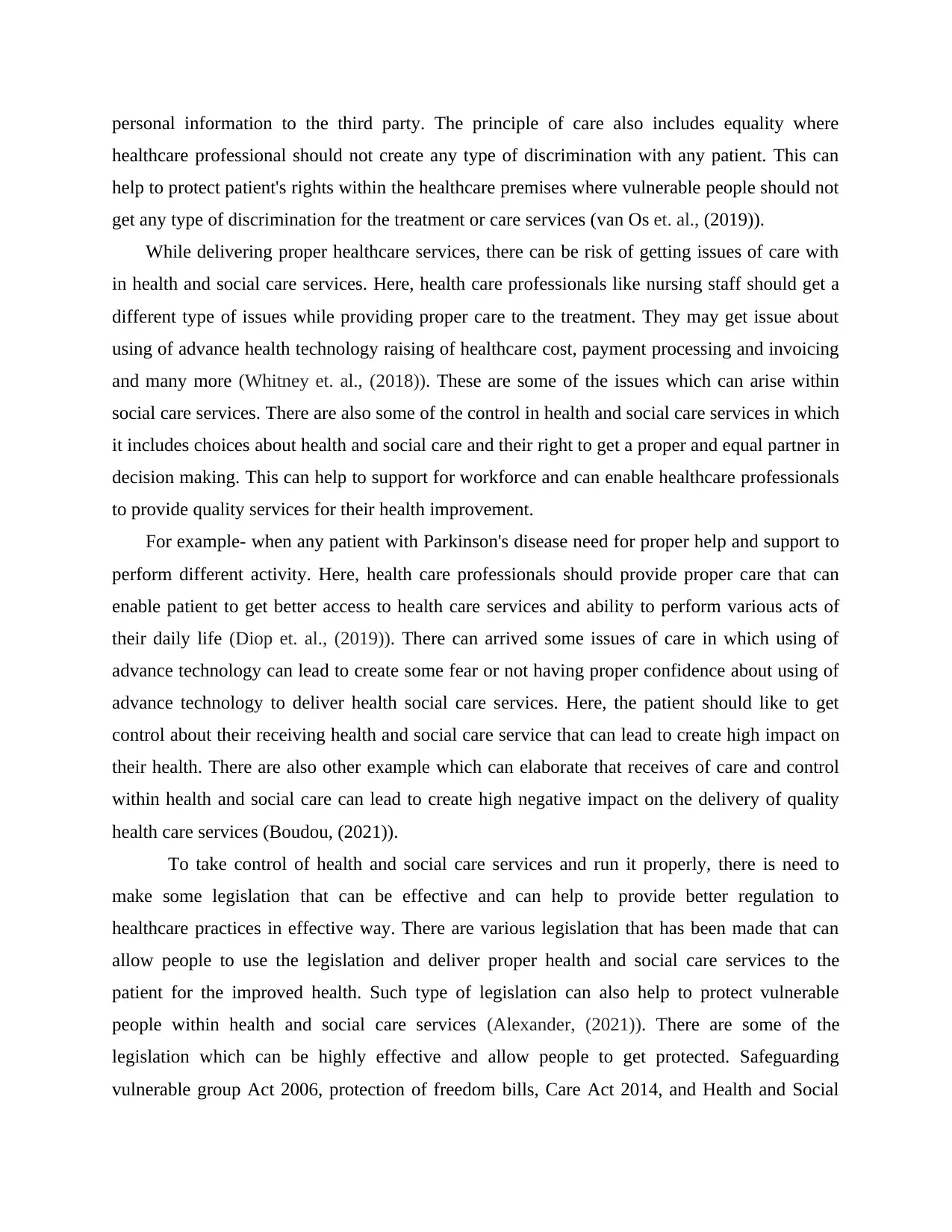
personal information to the third party. The principle of care also includes equality where
healthcare professional should not create any type of discrimination with any patient. This can
help to protect patient's rights within the healthcare premises where vulnerable people should not
get any type of discrimination for the treatment or care services (van Os et. al., (2019)).
While delivering proper healthcare services, there can be risk of getting issues of care with
in health and social care services. Here, health care professionals like nursing staff should get a
different type of issues while providing proper care to the treatment. They may get issue about
using of advance health technology raising of healthcare cost, payment processing and invoicing
and many more (Whitney et. al., (2018)). These are some of the issues which can arise within
social care services. There are also some of the control in health and social care services in which
it includes choices about health and social care and their right to get a proper and equal partner in
decision making. This can help to support for workforce and can enable healthcare professionals
to provide quality services for their health improvement.
For example- when any patient with Parkinson's disease need for proper help and support to
perform different activity. Here, health care professionals should provide proper care that can
enable patient to get better access to health care services and ability to perform various acts of
their daily life (Diop et. al., (2019)). There can arrived some issues of care in which using of
advance technology can lead to create some fear or not having proper confidence about using of
advance technology to deliver health social care services. Here, the patient should like to get
control about their receiving health and social care service that can lead to create high impact on
their health. There are also other example which can elaborate that receives of care and control
within health and social care can lead to create high negative impact on the delivery of quality
health care services (Boudou, (2021)).
To take control of health and social care services and run it properly, there is need to
make some legislation that can be effective and can help to provide better regulation to
healthcare practices in effective way. There are various legislation that has been made that can
allow people to use the legislation and deliver proper health and social care services to the
patient for the improved health. Such type of legislation can also help to protect vulnerable
people within health and social care services (Alexander, (2021)). There are some of the
legislation which can be highly effective and allow people to get protected. Safeguarding
vulnerable group Act 2006, protection of freedom bills, Care Act 2014, and Health and Social
healthcare professional should not create any type of discrimination with any patient. This can
help to protect patient's rights within the healthcare premises where vulnerable people should not
get any type of discrimination for the treatment or care services (van Os et. al., (2019)).
While delivering proper healthcare services, there can be risk of getting issues of care with
in health and social care services. Here, health care professionals like nursing staff should get a
different type of issues while providing proper care to the treatment. They may get issue about
using of advance health technology raising of healthcare cost, payment processing and invoicing
and many more (Whitney et. al., (2018)). These are some of the issues which can arise within
social care services. There are also some of the control in health and social care services in which
it includes choices about health and social care and their right to get a proper and equal partner in
decision making. This can help to support for workforce and can enable healthcare professionals
to provide quality services for their health improvement.
For example- when any patient with Parkinson's disease need for proper help and support to
perform different activity. Here, health care professionals should provide proper care that can
enable patient to get better access to health care services and ability to perform various acts of
their daily life (Diop et. al., (2019)). There can arrived some issues of care in which using of
advance technology can lead to create some fear or not having proper confidence about using of
advance technology to deliver health social care services. Here, the patient should like to get
control about their receiving health and social care service that can lead to create high impact on
their health. There are also other example which can elaborate that receives of care and control
within health and social care can lead to create high negative impact on the delivery of quality
health care services (Boudou, (2021)).
To take control of health and social care services and run it properly, there is need to
make some legislation that can be effective and can help to provide better regulation to
healthcare practices in effective way. There are various legislation that has been made that can
allow people to use the legislation and deliver proper health and social care services to the
patient for the improved health. Such type of legislation can also help to protect vulnerable
people within health and social care services (Alexander, (2021)). There are some of the
legislation which can be highly effective and allow people to get protected. Safeguarding
vulnerable group Act 2006, protection of freedom bills, Care Act 2014, and Health and Social
⊘ This is a preview!⊘
Do you want full access?
Subscribe today to unlock all pages.

Trusted by 1+ million students worldwide
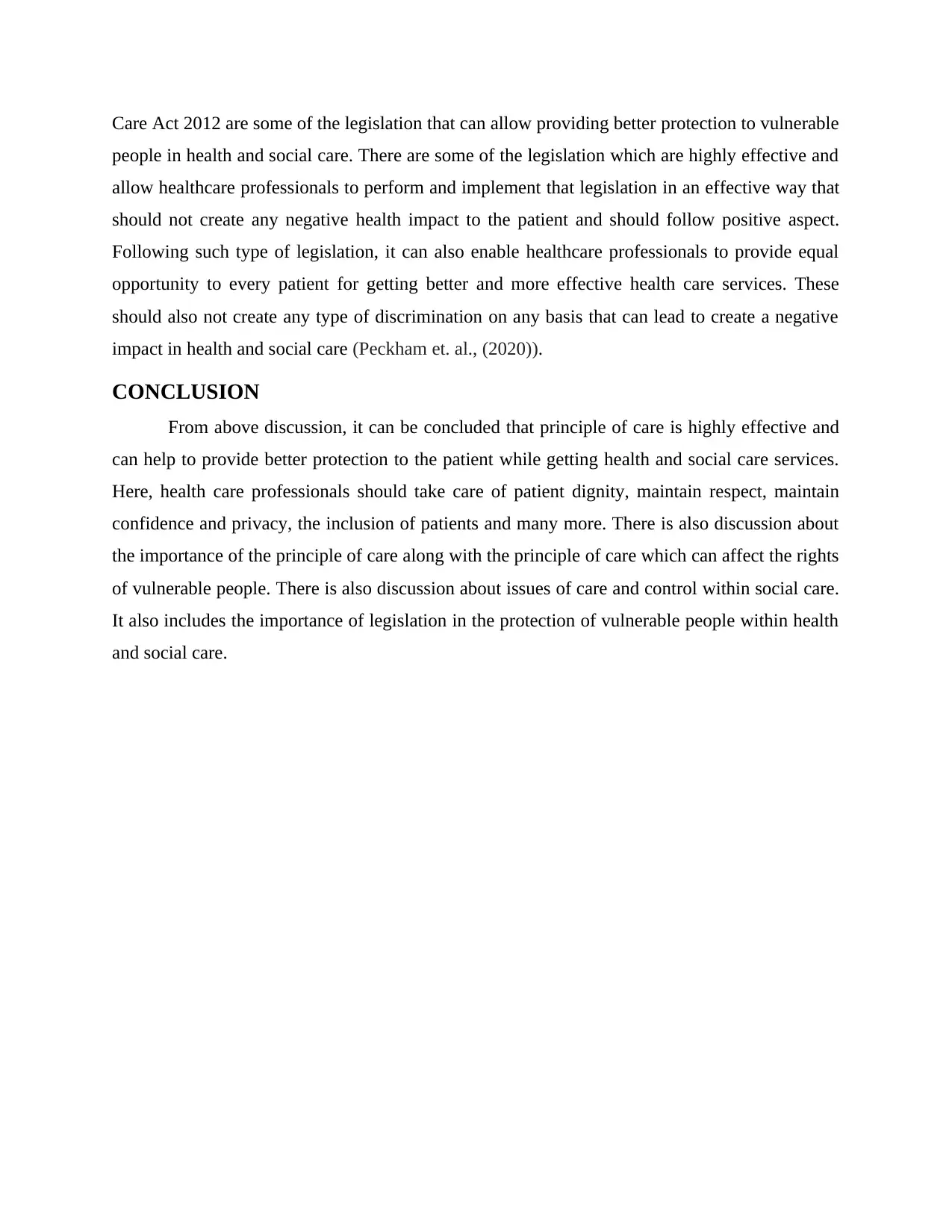
Care Act 2012 are some of the legislation that can allow providing better protection to vulnerable
people in health and social care. There are some of the legislation which are highly effective and
allow healthcare professionals to perform and implement that legislation in an effective way that
should not create any negative health impact to the patient and should follow positive aspect.
Following such type of legislation, it can also enable healthcare professionals to provide equal
opportunity to every patient for getting better and more effective health care services. These
should also not create any type of discrimination on any basis that can lead to create a negative
impact in health and social care (Peckham et. al., (2020)).
CONCLUSION
From above discussion, it can be concluded that principle of care is highly effective and
can help to provide better protection to the patient while getting health and social care services.
Here, health care professionals should take care of patient dignity, maintain respect, maintain
confidence and privacy, the inclusion of patients and many more. There is also discussion about
the importance of the principle of care along with the principle of care which can affect the rights
of vulnerable people. There is also discussion about issues of care and control within social care.
It also includes the importance of legislation in the protection of vulnerable people within health
and social care.
people in health and social care. There are some of the legislation which are highly effective and
allow healthcare professionals to perform and implement that legislation in an effective way that
should not create any negative health impact to the patient and should follow positive aspect.
Following such type of legislation, it can also enable healthcare professionals to provide equal
opportunity to every patient for getting better and more effective health care services. These
should also not create any type of discrimination on any basis that can lead to create a negative
impact in health and social care (Peckham et. al., (2020)).
CONCLUSION
From above discussion, it can be concluded that principle of care is highly effective and
can help to provide better protection to the patient while getting health and social care services.
Here, health care professionals should take care of patient dignity, maintain respect, maintain
confidence and privacy, the inclusion of patients and many more. There is also discussion about
the importance of the principle of care along with the principle of care which can affect the rights
of vulnerable people. There is also discussion about issues of care and control within social care.
It also includes the importance of legislation in the protection of vulnerable people within health
and social care.
Paraphrase This Document
Need a fresh take? Get an instant paraphrase of this document with our AI Paraphraser
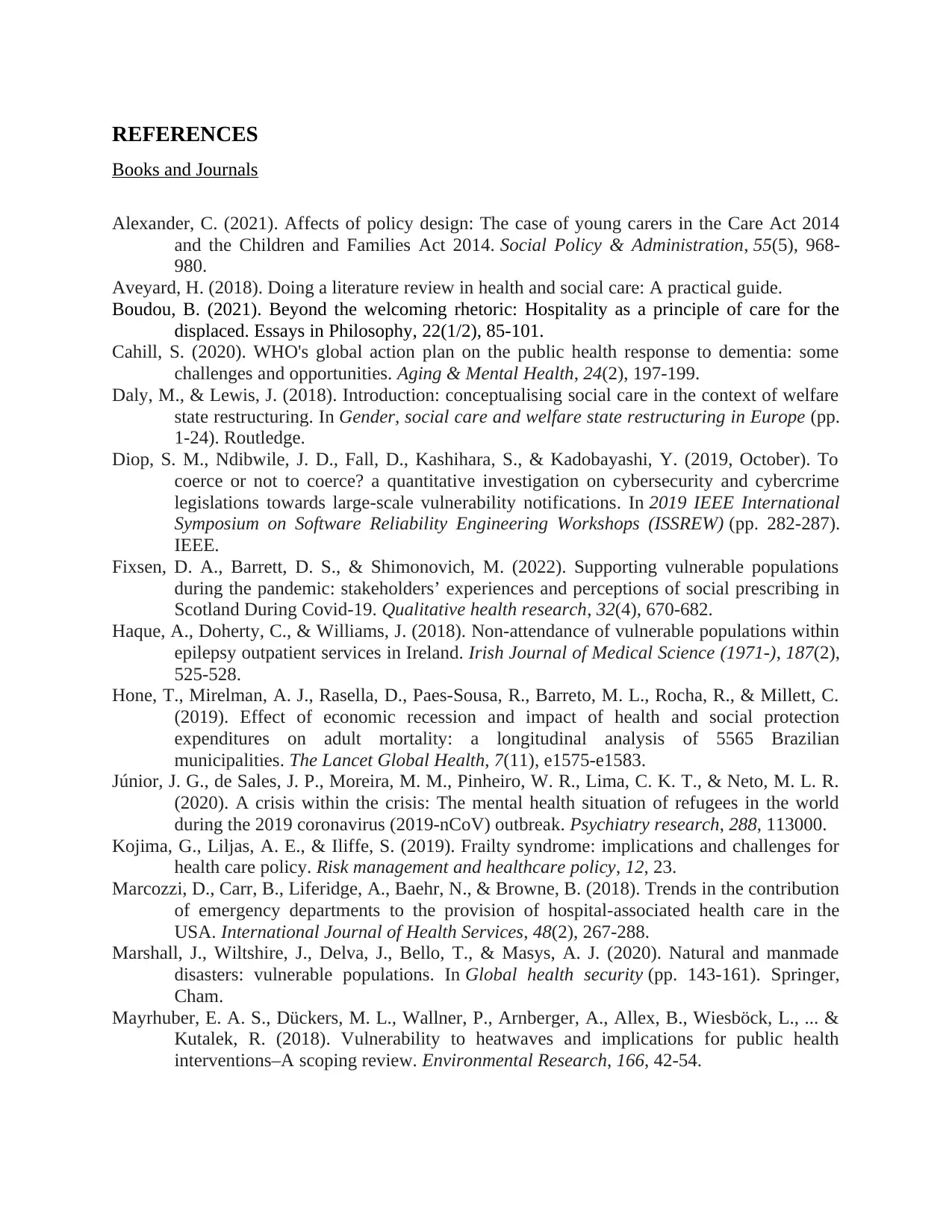
REFERENCES
Books and Journals
Alexander, C. (2021). Affects of policy design: The case of young carers in the Care Act 2014
and the Children and Families Act 2014. Social Policy & Administration, 55(5), 968-
980.
Aveyard, H. (2018). Doing a literature review in health and social care: A practical guide.
Boudou, B. (2021). Beyond the welcoming rhetoric: Hospitality as a principle of care for the
displaced. Essays in Philosophy, 22(1/2), 85-101.
Cahill, S. (2020). WHO's global action plan on the public health response to dementia: some
challenges and opportunities. Aging & Mental Health, 24(2), 197-199.
Daly, M., & Lewis, J. (2018). Introduction: conceptualising social care in the context of welfare
state restructuring. In Gender, social care and welfare state restructuring in Europe (pp.
1-24). Routledge.
Diop, S. M., Ndibwile, J. D., Fall, D., Kashihara, S., & Kadobayashi, Y. (2019, October). To
coerce or not to coerce? a quantitative investigation on cybersecurity and cybercrime
legislations towards large-scale vulnerability notifications. In 2019 IEEE International
Symposium on Software Reliability Engineering Workshops (ISSREW) (pp. 282-287).
IEEE.
Fixsen, D. A., Barrett, D. S., & Shimonovich, M. (2022). Supporting vulnerable populations
during the pandemic: stakeholders’ experiences and perceptions of social prescribing in
Scotland During Covid-19. Qualitative health research, 32(4), 670-682.
Haque, A., Doherty, C., & Williams, J. (2018). Non-attendance of vulnerable populations within
epilepsy outpatient services in Ireland. Irish Journal of Medical Science (1971-), 187(2),
525-528.
Hone, T., Mirelman, A. J., Rasella, D., Paes-Sousa, R., Barreto, M. L., Rocha, R., & Millett, C.
(2019). Effect of economic recession and impact of health and social protection
expenditures on adult mortality: a longitudinal analysis of 5565 Brazilian
municipalities. The Lancet Global Health, 7(11), e1575-e1583.
Júnior, J. G., de Sales, J. P., Moreira, M. M., Pinheiro, W. R., Lima, C. K. T., & Neto, M. L. R.
(2020). A crisis within the crisis: The mental health situation of refugees in the world
during the 2019 coronavirus (2019-nCoV) outbreak. Psychiatry research, 288, 113000.
Kojima, G., Liljas, A. E., & Iliffe, S. (2019). Frailty syndrome: implications and challenges for
health care policy. Risk management and healthcare policy, 12, 23.
Marcozzi, D., Carr, B., Liferidge, A., Baehr, N., & Browne, B. (2018). Trends in the contribution
of emergency departments to the provision of hospital-associated health care in the
USA. International Journal of Health Services, 48(2), 267-288.
Marshall, J., Wiltshire, J., Delva, J., Bello, T., & Masys, A. J. (2020). Natural and manmade
disasters: vulnerable populations. In Global health security (pp. 143-161). Springer,
Cham.
Mayrhuber, E. A. S., Dückers, M. L., Wallner, P., Arnberger, A., Allex, B., Wiesböck, L., ... &
Kutalek, R. (2018). Vulnerability to heatwaves and implications for public health
interventions–A scoping review. Environmental Research, 166, 42-54.
Books and Journals
Alexander, C. (2021). Affects of policy design: The case of young carers in the Care Act 2014
and the Children and Families Act 2014. Social Policy & Administration, 55(5), 968-
980.
Aveyard, H. (2018). Doing a literature review in health and social care: A practical guide.
Boudou, B. (2021). Beyond the welcoming rhetoric: Hospitality as a principle of care for the
displaced. Essays in Philosophy, 22(1/2), 85-101.
Cahill, S. (2020). WHO's global action plan on the public health response to dementia: some
challenges and opportunities. Aging & Mental Health, 24(2), 197-199.
Daly, M., & Lewis, J. (2018). Introduction: conceptualising social care in the context of welfare
state restructuring. In Gender, social care and welfare state restructuring in Europe (pp.
1-24). Routledge.
Diop, S. M., Ndibwile, J. D., Fall, D., Kashihara, S., & Kadobayashi, Y. (2019, October). To
coerce or not to coerce? a quantitative investigation on cybersecurity and cybercrime
legislations towards large-scale vulnerability notifications. In 2019 IEEE International
Symposium on Software Reliability Engineering Workshops (ISSREW) (pp. 282-287).
IEEE.
Fixsen, D. A., Barrett, D. S., & Shimonovich, M. (2022). Supporting vulnerable populations
during the pandemic: stakeholders’ experiences and perceptions of social prescribing in
Scotland During Covid-19. Qualitative health research, 32(4), 670-682.
Haque, A., Doherty, C., & Williams, J. (2018). Non-attendance of vulnerable populations within
epilepsy outpatient services in Ireland. Irish Journal of Medical Science (1971-), 187(2),
525-528.
Hone, T., Mirelman, A. J., Rasella, D., Paes-Sousa, R., Barreto, M. L., Rocha, R., & Millett, C.
(2019). Effect of economic recession and impact of health and social protection
expenditures on adult mortality: a longitudinal analysis of 5565 Brazilian
municipalities. The Lancet Global Health, 7(11), e1575-e1583.
Júnior, J. G., de Sales, J. P., Moreira, M. M., Pinheiro, W. R., Lima, C. K. T., & Neto, M. L. R.
(2020). A crisis within the crisis: The mental health situation of refugees in the world
during the 2019 coronavirus (2019-nCoV) outbreak. Psychiatry research, 288, 113000.
Kojima, G., Liljas, A. E., & Iliffe, S. (2019). Frailty syndrome: implications and challenges for
health care policy. Risk management and healthcare policy, 12, 23.
Marcozzi, D., Carr, B., Liferidge, A., Baehr, N., & Browne, B. (2018). Trends in the contribution
of emergency departments to the provision of hospital-associated health care in the
USA. International Journal of Health Services, 48(2), 267-288.
Marshall, J., Wiltshire, J., Delva, J., Bello, T., & Masys, A. J. (2020). Natural and manmade
disasters: vulnerable populations. In Global health security (pp. 143-161). Springer,
Cham.
Mayrhuber, E. A. S., Dückers, M. L., Wallner, P., Arnberger, A., Allex, B., Wiesböck, L., ... &
Kutalek, R. (2018). Vulnerability to heatwaves and implications for public health
interventions–A scoping review. Environmental Research, 166, 42-54.
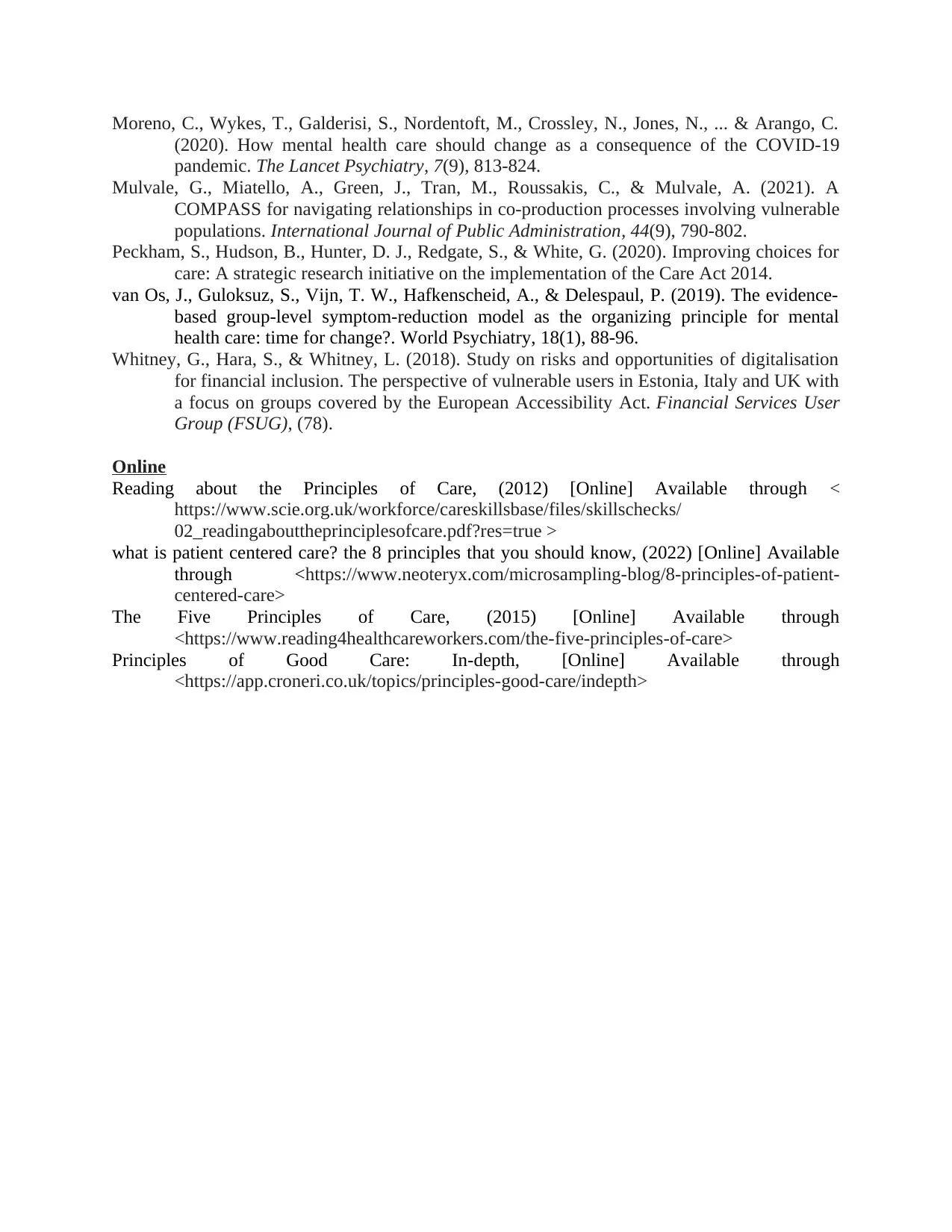
Moreno, C., Wykes, T., Galderisi, S., Nordentoft, M., Crossley, N., Jones, N., ... & Arango, C.
(2020). How mental health care should change as a consequence of the COVID-19
pandemic. The Lancet Psychiatry, 7(9), 813-824.
Mulvale, G., Miatello, A., Green, J., Tran, M., Roussakis, C., & Mulvale, A. (2021). A
COMPASS for navigating relationships in co-production processes involving vulnerable
populations. International Journal of Public Administration, 44(9), 790-802.
Peckham, S., Hudson, B., Hunter, D. J., Redgate, S., & White, G. (2020). Improving choices for
care: A strategic research initiative on the implementation of the Care Act 2014.
van Os, J., Guloksuz, S., Vijn, T. W., Hafkenscheid, A., & Delespaul, P. (2019). The evidence‐
based group‐level symptom‐reduction model as the organizing principle for mental
health care: time for change?. World Psychiatry, 18(1), 88-96.
Whitney, G., Hara, S., & Whitney, L. (2018). Study on risks and opportunities of digitalisation
for financial inclusion. The perspective of vulnerable users in Estonia, Italy and UK with
a focus on groups covered by the European Accessibility Act. Financial Services User
Group (FSUG), (78).
Online
Reading about the Principles of Care, (2012) [Online] Available through <
https://www.scie.org.uk/workforce/careskillsbase/files/skillschecks/
02_readingabouttheprinciplesofcare.pdf?res=true >
what is patient centered care? the 8 principles that you should know, (2022) [Online] Available
through <https://www.neoteryx.com/microsampling-blog/8-principles-of-patient-
centered-care>
The Five Principles of Care, (2015) [Online] Available through
<https://www.reading4healthcareworkers.com/the-five-principles-of-care>
Principles of Good Care: In-depth, [Online] Available through
<https://app.croneri.co.uk/topics/principles-good-care/indepth>
(2020). How mental health care should change as a consequence of the COVID-19
pandemic. The Lancet Psychiatry, 7(9), 813-824.
Mulvale, G., Miatello, A., Green, J., Tran, M., Roussakis, C., & Mulvale, A. (2021). A
COMPASS for navigating relationships in co-production processes involving vulnerable
populations. International Journal of Public Administration, 44(9), 790-802.
Peckham, S., Hudson, B., Hunter, D. J., Redgate, S., & White, G. (2020). Improving choices for
care: A strategic research initiative on the implementation of the Care Act 2014.
van Os, J., Guloksuz, S., Vijn, T. W., Hafkenscheid, A., & Delespaul, P. (2019). The evidence‐
based group‐level symptom‐reduction model as the organizing principle for mental
health care: time for change?. World Psychiatry, 18(1), 88-96.
Whitney, G., Hara, S., & Whitney, L. (2018). Study on risks and opportunities of digitalisation
for financial inclusion. The perspective of vulnerable users in Estonia, Italy and UK with
a focus on groups covered by the European Accessibility Act. Financial Services User
Group (FSUG), (78).
Online
Reading about the Principles of Care, (2012) [Online] Available through <
https://www.scie.org.uk/workforce/careskillsbase/files/skillschecks/
02_readingabouttheprinciplesofcare.pdf?res=true >
what is patient centered care? the 8 principles that you should know, (2022) [Online] Available
through <https://www.neoteryx.com/microsampling-blog/8-principles-of-patient-
centered-care>
The Five Principles of Care, (2015) [Online] Available through
<https://www.reading4healthcareworkers.com/the-five-principles-of-care>
Principles of Good Care: In-depth, [Online] Available through
<https://app.croneri.co.uk/topics/principles-good-care/indepth>
⊘ This is a preview!⊘
Do you want full access?
Subscribe today to unlock all pages.

Trusted by 1+ million students worldwide

1 out of 10
Related Documents
Your All-in-One AI-Powered Toolkit for Academic Success.
+13062052269
info@desklib.com
Available 24*7 on WhatsApp / Email
![[object Object]](/_next/static/media/star-bottom.7253800d.svg)
Unlock your academic potential
Copyright © 2020–2026 A2Z Services. All Rights Reserved. Developed and managed by ZUCOL.



